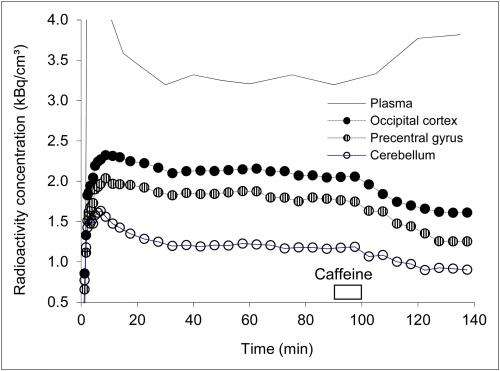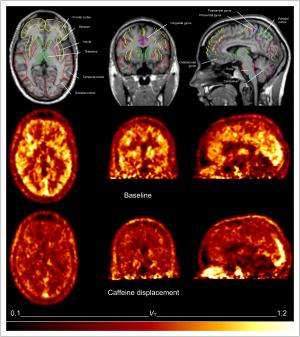Caffeine's effect on the brain's adenosine receptors visualized for the first time

Molecular imaging with positron emission tomography (PET) has enabled scientists for the first time to visualize binding sites of caffeine in the living human brain to explore possible positive and negative effects of caffeine consumption. According to research published in the November issue of The Journal of Nuclear Medicine, PET imaging with F-18-8-cyclopentyl-3-(3-fluoropropyl)-1-propylxanthine (F-18-CPFPX) shows that repeated intake of caffeinated beverages throughout a day results in up to 50 percent occupancy of the brain's A1 adenosine receptors.
"The effects of caffeine to the human body are generally attributed to the cerebral adenosine receptors. In the human brain the A1 adenosine receptor is the most abundant," said David Elmenhorst, MD, lead author of "Caffeine Occupancy of Human Cerebral A1 Adenosine Receptors: In Vivo Quantification with F-18-CPFPX and PET." "In vitro studies have shown that commonly consumed quantities of caffeine have led to a high A1 adenosine occupancy. Our study aimed to measure the A1 adenosine receptor occupancy with in vivo imaging."

Fifteen male volunteers participated in the study. They abstained from caffeine intake for 36 hours and then underwent a PET scan with F-18-CPFPX. Caffeine was then introduced in short intravenous infusions, increasing in amount. To estimate the occupancy of A1 adenosine receptors by caffeine, the distribution volume at the baseline period of the PET scan was compared with the distribution volume after caffeine administration. Researchers determined that the concentration of the caffeine that displaces 50 percent of the binding of F-18-CPFPX to the A1 adenosine receptor was 13 mg/L, or approximately four to five cups of coffee.
An important finding of the study is that in most regular coffee drinkers about half of the A1 adenosine receptors may be occupied by caffeine. It is likely that this blockage of a substantial amount of cerebral A1 adenosine receptors will result in adaptive changes and lead to chronic alterations of receptor express and availability.
"There is substantial evidence that caffeine is protective against neurodegenerative diseases like Parkinson's or Alzheimer's disease," noted Elmenhorst. "Several investigations show that moderate coffee consumption of 3 to 5 cups per day at mid-life is linked to a reduced risk of dementia in late life. The present study provides evidence that typical caffeine doses result in a high A1 adenosine receptor occupancy and supports the view that the A1 adenosine receptor deserves broader attention in the context of neurodegenerative disorders."
Caffeine is the most commonly consumed psychoactive substance worldwide and an active ingredient in innumerable food and beverages. Eighty percent of U.S. adults consume caffeine every day; the average for adults is 200 mg of caffeine per day (two 5-ounce cups of coffee or four sodas). It affects an individual's alertness, attention, cognitive performance, as well as reduces sleepiness.
More information: "Caffeine Occupancy of Human Cerebral A1 Adenosine Receptors: In Vivo Quantification with 18F-CPFPX and PET", The Journal of Nuclear Medicine, 2012.
















